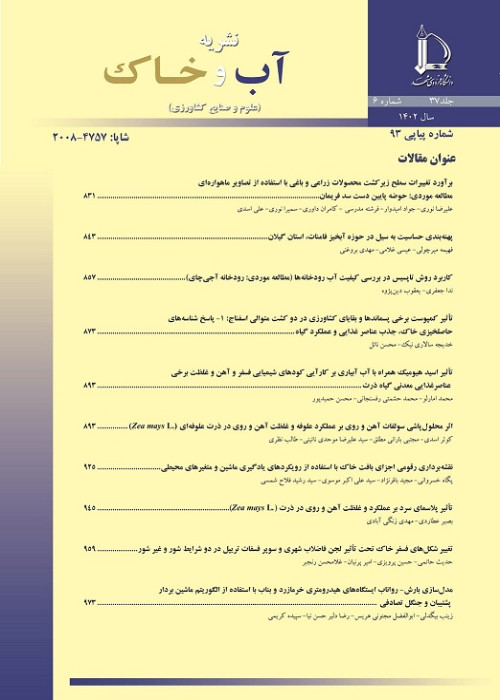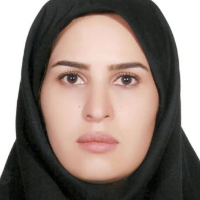Increasing the Yield and Yield Components of Sunflower by Integrated Application of Phosphorus and Sewage Sludge under Optimum and Limited Irrigation Conditions
Author(s):
Article Type:
Research/Original Article (دارای رتبه معتبر)
Abstract:
Introduction
Sunflower as one of the most important oil crops in the world is affected by water deficit stress. Water deficit stress is one of the most important limiting factors of crops growth and production in Iran and many regions of the world. Because of the low water productivity in Iran, the water conservation and increasing of water use efficiency through good management including integrated application of organic and chemical fertilizers and balanced nutrition of plants are necessary. One of the negative effects of water deficit stress is impaired uptake of nutrients such as phosphorus (P) by plants and a decrease in plant yield. It has been found that use of P can reduce the negative effects of drought stress on plants that means the tolerance of plants to drought stress increases with optimal nutrition of P. In Iran, due to the lack of organic matter and the high cost of chemical fertilizers, farmers tend to use organic wastes such as sewage sludge that can have an important contribution in the improvement of soil fertility and plant nutrition and lead to an increase in water use efficiency. Also, integrated and suitable nutrition of plants is a method of sustainable management of soil fertility under environmental stresses. Therefore, this study aimed to evaluate the effects of sewage sludge (SS) and triple superphosphate (TSP) on sunflower (Helianthus annuus L. cv. Farrokh) seed yield and its components and determining the optimal levels of their consumption under optimum and limited irrigation conditions.Materials And Methods
This experiment was conducted as a split-plot factorial arrangement in a randomized complete block design in Agricultural Research Station of Khoy under field conditions for two years. Experimental factors were irrigation time at two levels (irrigation after 60 and 150 mm evaporation from class A evaporation pan), triple superphosphate at three levels (0, 100 and 200 kg/ha), sewage sludge at four levels (0, 14.2, 28.4 and 56.7 t/ha) and year at two levels (2014 and 2015) with three replications. The 1000 seed weight of sunflower, weight and number of seeds per plant, the percentage of empty achenes, head diameter and seed yield were measured at the end of plant growth period. Statistical analysis of the data was performed using MSTATC software and means comparison was done by Duncans multiple range test at 5% probability level.Results And Discussion
The combined analysis of variances showed that the effect of year was significant for weight of seeds per plant, head diameter and seed yield but it is not significant for 1000 seed weight, number of seeds per plant and percentage of empty achenes. Although water deficit stress significantly increased the percentage of empty achenes but 1000 seed weight, weight and number of seeds per plant, head diameter and seed yield significantly decreased compared to optimum irrigation conditions. The application of integrated application of 200 kg TSP and 56.7 tons SS per ha increased yield and yield components significantly compared to the control treatment. The interaction effects of TSP×SS×irrigation were significant for all studied characteristics. Under optimum irrigation condition, the highest 1000 seed weight (64 g), weight of seeds per plant (85 g), number of seeds per plant (1513), head diameter (22 cm) and seed yield (5576 kg/ha) were observed in intergrated treatment of 200 kg TSP.7 tons SS/ha. Under limited irrigation condition, the highest 1000 seed weight (57 g), seeds weight per plant (81 g), seeds number per plant (1494), head diameter (19.6 cm) and seed yield (5322 kg/ha) were obtained from 56.7 tons SS/ha treatment which showed no significant difference with 100 kg TSP.7 tons SS/ha treatment. Under optimum and limited irrigation conditions, the percentage of empty achenes were significantly decreased by integrated treatments of 200 kg TSP.7 tons SS/ha and 100 kg TSP.7 tons SS/ha (70 and 81 percent, respectively) compared to the control.Conclusion
The results of this study indicated that integrated application of triple superphosphate and sewage sludge can mitigate negative effects of drought stress; therefore in order to reduce the use of chemical fertilizers, increasing sunflower seed yield and development of sustainable agriculture, integrated treatments of 200 kg TSP.7 tons SS/ha under optimum irrigation and 100 kg TSP.7 tons SS/ha under limited irrigation can be recommended at similar conditions (from the aspect of soil, plant, sewage sludge and climate).Keywords:
Language:
Persian
Published:
Journal of water and soil, Volume:31 Issue: 6, 2018
Pages:
1637 to 1650
magiran.com/p1809906
دانلود و مطالعه متن این مقاله با یکی از روشهای زیر امکان پذیر است:
اشتراک شخصی
با عضویت و پرداخت آنلاین حق اشتراک یکساله به مبلغ 1,390,000ريال میتوانید 70 عنوان مطلب دانلود کنید!
اشتراک سازمانی
به کتابخانه دانشگاه یا محل کار خود پیشنهاد کنید تا اشتراک سازمانی این پایگاه را برای دسترسی نامحدود همه کاربران به متن مطالب تهیه نمایند!
توجه!
- حق عضویت دریافتی صرف حمایت از نشریات عضو و نگهداری، تکمیل و توسعه مگیران میشود.
- پرداخت حق اشتراک و دانلود مقالات اجازه بازنشر آن در سایر رسانههای چاپی و دیجیتال را به کاربر نمیدهد.
In order to view content subscription is required
Personal subscription
Subscribe magiran.com for 70 € euros via PayPal and download 70 articles during a year.
Organization subscription
Please contact us to subscribe your university or library for unlimited access!




